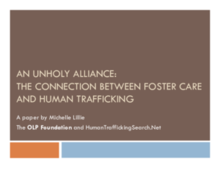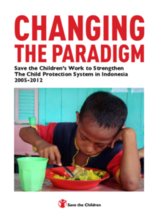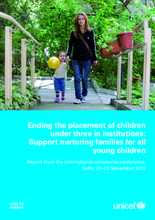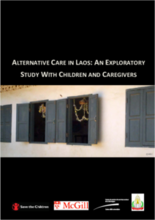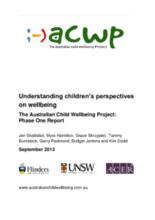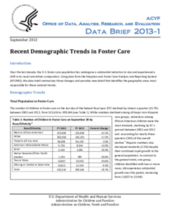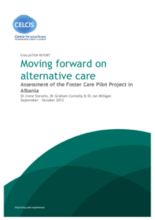Displaying 1911 - 1920 of 2221
This presentation, given at the Fifth Annual Interdisciplinary Conference on Human Trafficking 2013, describes a research paper that examines the connection between foster care and human trafficking in the United States with special emphasis on sex trafficking.
This study compares the data on young people transitioning from out of home care from 9 non-communist European countries examined in the INTRAC document with 14 post-communist countries reviewed in the SOS and INTRAC publications.
This report documents the work conducted by Save the Children in collaboration with the Indonesian Ministry of Social Affairs over a period of 7 years to strengthen the national child protection system and change the underlying paradigm for that system away from over-reliance on residential care and towards child and family centered responses.
This Report from the international ministerial conference, held in Sofia, 21–22 November 2012, entitled 'Ending the placement of children under three in institutions: support nurturing families for all young children', brings together the presentations, political commitments and priority actions identified by the participants, including 20 governments from Eastern Europe and Central Asia.
This report summarizes the findings of a study on parental and alternative childcare in Luang Prabang and Xayabury provinces in Northern Lao People’s Democratic Republic.
This document reports on Phase One of the Australian Child Wellbeing Project, a child-centred study in which young people’s perspectives are being used to design a major nationally representative survey of wellbeing among 8-14 year olds, and to interpret findings from that survey. It uses focus groups and in-depth interviews with young people in six groups who are often seen as experiencing high levels of marginalisation or as having particular experiences and needs, including young people living in out of home care and young people living with disability.
This chart produced by the US Government's Children's Bureau includes data submitted to the Adoption and Foster Care Analysis and Reporting System (AFCARS) by US States, the District of Columbia and Puerto Rico by July 19, 2013.
Over the last decade, the U.S. foster care population has undergone a substantial reduction in size and experienced a shift in its racial and ethnic composition. Using data from the Adoption and Foster Care Analysis and Reporting System (AFCARS), this data brief summarizes those changes and provides new detail that identifies the geographic areas most responsible for these national trends.
This paper presents an evaluation of the pilot foster care project (FCPP) in Albania.
This study funded by Big Lottery and undertaken in partnership between the University of Bristol and Buttle UK, a grant-giving charity for vulnerable children, aims to fill gaps in understanding about the experiences of children living with kins, and in particular how children in informal kinship care view their situation.

